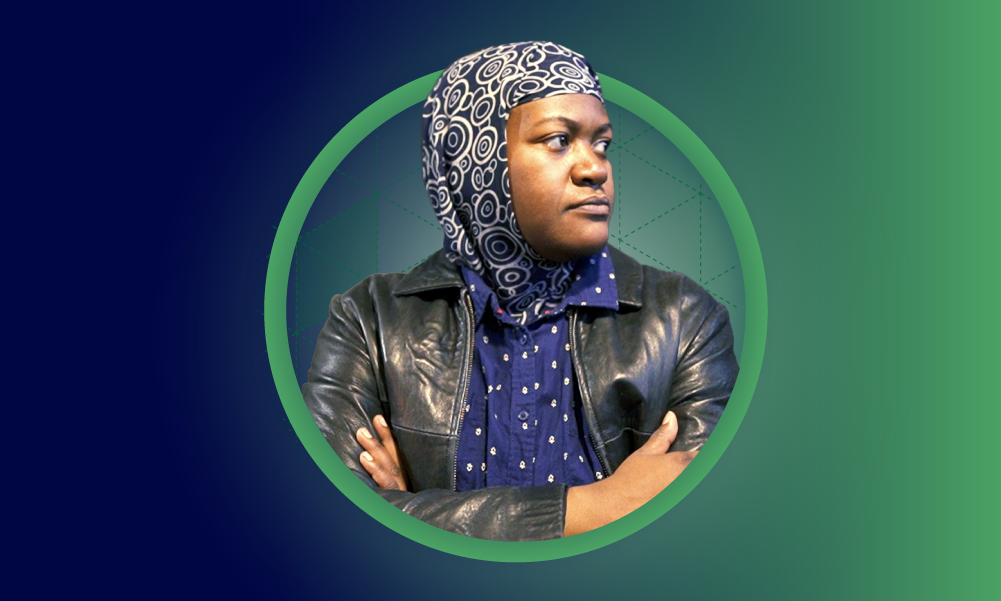Expel culture · 6 MIN READ · CAT STARKEY AND CHAR CUSTODIO · JAN 10, 2024 · TAGS: Expletives / leadership & management
Q&A with Cat Starkey, Expel VP of Engineering and SRE Char Custodio (with her take on the Grace Hopper Celebration controversy)
The tech industry, and especially engineering jobs, can be difficult for women, and last year’s Grace Hopper Celebration illustrated the lack of respect, if not outright hostility, female professionals face.
Videos posted to social media showed scenes of men flocking around recruiters, running into event venues and cutting in front of women to get an interview slot. Footage showed a sea of people, hundreds deep, waiting in line for a chance to enter the career expo.
As one poster put it, “the Kens had taken over Barbieland.”
Expel site reliability engineer (SRE) Char Custodio was there, and in this interview talks about the debacle and her own general frustrations trying to succeed in a bro-centric industry.
_____
Cat: Let’s start by learning a little bit about you, Char. How long have you been at Expel? What’s your title and what does that entail?
Char: I’ve been with Expel for 11 months now. I’m an SRE on the Developer Experience team. We support Engineering in getting their code shipped to production along with supporting their work afterward.
Cat: Can you share a bit about your journey to get into engineering?
Char: Sure. I have two brothers who are 10 and 15 years older than me. Around when I was five-eight years old, my older brother was learning Fortran and COBOL, and the other one was learning ActionScript for Flash (back when Flash games and Yahoo games were a thing). Since I wasn’t allowed to watch TV on school days, I’d pull up a chair and watch them do their programming projects for college. When their computers weren’t being used, my interest would grow as I learned how to browse the Internet. I eventually picked up some HTML, CSS, PHP, and Python throughout that process. 10 years later, I took up Management Information Systems as my major in college. After college, I got a job as a QA engineer, but all the test automation projects I was working with had a lot of parallel with DevOps (which was just emerging) and that led me to getting a position as DevOps engineer and eventually an SRE.
Cat: What has been your experience as a female SRE? What (if any) challenges have you faced in a predominantly male field?
Char: In my previous work experiences, it wasn’t uncommon for me to be the only female engineer in a room of 40-80 SRE/systems/network/DevOps engineers. The bro-ey culture made it difficult to find mentorship. Bros were just looking out for their fellow bros, I guess. It made it very hard for me to connect with my peers and made it difficult to ask for help and grow in my career. It was so difficult that I decided to quit tech altogether. I worked as a pastry chef/baker for two years until I found out about Expel.
Cat: What a journey you’ve had. Unfortunately, my experience—and like the experience of many other women in technology—before Expel was quite similar. Last year you attended the Grace Hopper Celebration, a major industry conference designed to bring together women in computing. What were your goals going into it?
Char: My primary goal was to meet other female SREs and learn about their experiences working in the field.
Cat: The GHC is highly anticipated. What were your expectations of the conference, and what about it met those expectations or fell short this year?
Char: I was able to connect and meet at least five other women SREs, which was wonderful. This is a big number, even if they were the only ones I met out of the 17,000+ attendees.
I wanted to attend talks and learn about what other women in engineering have been working on, but I was disappointed to find out a lot of the talks are leaning towards leadership and management roles. It doesn’t help that a common path (at least here in San Francisco) is that most women only stay in technical roles for a year or two—five max—before moving to other positions outside engineering.
There were a lot of male attendees, which was a surprise. I was expecting to network and chat with other women. I thought this conference was supposed to be a safe space for female and non-binary tech workers.
Cat: I was so disappointed to hear your experience wasn’t as positive as you’d hoped. You discussed it with your manager and director when you returned. When we chatted, you said they were really supportive.
Char: Expel is a bit of an outlier in the tech industry. I had so much support before and after the conference. When I came back, I was able to chat with Adam, Evan, and Reilly [senior members of Expel’s engineering team]. We talked about how GHC went and if I was able to meet my goals. They were very reassuring and offered advice on how to keep up my newfound contacts. But perhaps even more encouraging was that they truly listened. They heard my frustrations and didn’t discount my experience—a respect I’ve rarely been afforded during my time in this industry.
Cat: This year’s GHC got a lot of coverage for all the wrong reasons. Have you noticed any positive changes or shifts in the tech industry relating to gender diversity and inclusion since you began your career?
Char: As bad as the pandemic was in general, I think having to work remotely greatly helped in promoting gender diversity and inclusion. Before COVID, I was limited to San Francisco Bay Area tech jobs. But when the entire tech industry adapted to remote work, it allowed me to find opportunities beyond the Bay Area and Silicon Valley. I was able to find companies who don’t want to be that stereotypical tech company with the same old toxic culture—thinly-veiled misogyny, racism, and classism. It doesn’t help that the largest tech companies in the Bay Area perpetuate these practices, so all the other tech companies follow.
Cat: Have you found support networks or mentors in your career, and how important have they been to your professional development?
Char: In my previous workplaces, I was always left to my own devices to learn what to do in my role. As I said earlier, it’s very hard for women to find a mentor in tech. I think since SREs need to be able to think through different spaces—to code in several programming languages, navigate through different CICD tools, always learning new technologies and practices, and providing on-call support—it was very difficult to know how and where to grow without a mentor. I relied heavily on a lot of testing locally, online forums, and documentation, so it felt like I had a hodge-podge of skills as an SRE. It was hard to avoid imposter syndrome and feel validated with my work.
Cat: I can identify with that. It was difficult for me to find mentors I could trust or even ask for help. What has your experience been at Expel? Any systems and groups that have affected your experience? Anything that stands out about Expel from other places you’ve worked?
Char: When I joined Expel and the Core Engineering Platform team this year, it was almost a shock. Everyone is very supportive and it helped me ramp up as an SRE and also relearn good habits and practices. Never have I had so many mentors and people looking out for me. Also, in previous jobs, I was always afraid to make mistakes and for any decision I made I always felt like I had to lawyer up and defend every little detail in my code and my work. Here, I’m more comfortable to try things out and grow at my own pace. I’m not afraid to fail since folks are more open to sharing tips and helping each other out. There’s also an awareness and consciousness about the entire Core Engineering Platform team’s psychological safety in giving and getting help and support. I think this kind of culture is so productive for me. More productive than in my previous work experiences—feeling happy in an environment really motivates me to do more and try harder.
Cat: I’m so happy to hear this. It’s very important to me that our organization is one where we thrive as excellent engineers and humans. Is there anything you wish others understood about what it means to be a woman in tech, particularly an SRE? About how you’re perceived, biases, or stereotypes you’d like to correct, or anything else?
Char: Wow, where to start. I wish everyone respected each other equally, period. No more fraternities, no more cliques, no more cool kids. When I connected with other female engineers at the conference, I heard about their frustrations in their own workplaces and they were the same frustrations I had before. As women in tech, it seems like we always have to prove ourselves in ways men don’t. Once we’ve exhausted ourselves, that same toxic culture is reinforced.
Cat: Couldn’t have said it better. Any advice for women considering a career in tech—engineering or otherwise?
Char: It’s easier than ever to learn how to code and get resources online. If you enjoy doing it, you should give it a go and learn. Build your GitHub repo and be open to trying out a variety of projects that interest you. Also, you don’t have to chase big tech companies, you don’t have to drink the Kool-Aid. If you can find a company that has a healthy work environment and culture, that’s priceless (that’s Expel for me). There’s still a lot of frustrating things about the tech industry and its culture, but I honestly think it’s slightly less toxic now than three years ago.
_____
A serious commitment to equity, inclusion, and diversity is a core foundational principle at Expel. If you’d like to know more, please visit our Careers page or send us a note.






